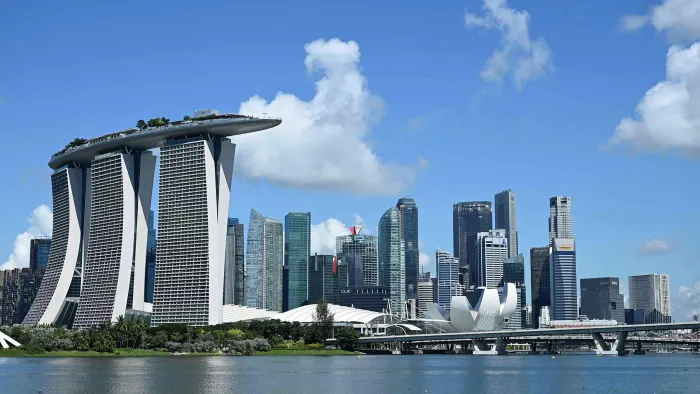Global Insights
As the pandemic restrictions ease up, emerging markets are well-positioned to make a comeback from their drastically low growth performance in 2021.
Fast-growing emerging markets like Vietnam and Chile, and “emerged” or developed economies like Singapore are prime locations for expanding your business.
We unpack each of these 3 hot markets’ economic, financial, and political climate so you can easily assess opportunities and risks associated with conducting business in these countries.
Vietnam: Asia’s Rising Star
Vietnam has all the right factors to make it an attractive international expansion target. From low-cost manufacturing, tariff leniency, and strategic location in Asia, to its position as an import and export processing center, and the relocation of foreign professionals in recent years, it’s no wonder it’s a fast-growing gem..
Vietnam’s economy has grown gradually in the past five years with high positive growth between 2017 and 2019, a slowdown in 2020, and an increase in 2021. The country’s GDP growth is expected to rise by 5.5% in 2022, up from 2.6% in 2021.
The most invested sectors include manufacturing, real estate, electricity production, wholesale and retail, and science and technology. While manufacturing is declining globally, it remains vital to Vietnam’s economic growth.
Over the years, Vietnam has gained the titles of a reliable supplier and alternative to China for manufactured exports, coming in as the top-performing Asian economy in 2020 and placing 15 in a ranking of the overall 20 best-performing markets in 2021 despite the pandemic.
Like many countries around the world, Vietnam transitioned from a zero-covid policy to one of flexible adaptation as vaccination rates climb. Due to its strategic location, this transition in covid policy will likely spur an increase in additional foreign workers fleeing harsh covid-19 restrictions in Hong Kong or China. Relatedly, before the pandemic, Vietnam was characterized by a high quantity of foreign workers. Along with lessened covid restrictions, Vietnam’s living costs remain much lower than China and Hong Kong and have less stringent state oversight, ultimately making it more attractive to foreigners.
For businesses in China seeking to relocate or companies on the verge of global expansion, Vietnam also allows for little or no tariffs since the country can bypass duties, owing to the several free trade agreements it participates in, including the most recent Regional Comprehensive Economic Partnership (RCEP) that will increase foreign direct investment inflows and provide an opportunity to raise exports. As Vietnam continues to be an attractive destination for investment and major free trade agreements, increased global and domestic emphasis on environmental sustainability in the country might have an impact on both the supply and demand of Vietnamese exports.
Chile: South America’s Less Known Opportunity
While Vietnam as an emerging and developing market is highly documented, Chile is less so. Chile’s relatively low corporate tax rate, highly-competitive economy, and steady GDP growth since the 2008 global financial crisis, are some reasons the country is an ideal location for expanding your business. Mining, manufacturing, and agriculture remain Chile’s top industries, while the tourism, retail, and telecommunication sectors have seen high growth in recent years.
GDP is likely to grow by 3.5% in 2022 from a year prior. Economic activity increased 10.2% in 2021 due to relaxed covid restrictions and higher vaccination rates. High natural resource production since 2020 has prevented the economy from slipping deep into the negative space.
The Rise of Sustainable (and Other) Businesses in Chile
The recent election of a new environmentalist government presents investors with an opportunity to form green business partnerships.
Historically, political turmoil in Latin America, at large, has been of great concern for business investors. However, Chile’s low political risk compared to other Latin American countries, like Brazil or Venezuela, acts as extra security for investors. Low political risk combined with the ease of setting up a business, low corporate tax rate, and a highly competitive economy present Chile as a suitable option for growing your business internationally.
Singapore: Asia’s Business Launch Pad
Only recently, Singapore was considered an emerging market by the World Bank and International Monetary Fund. Today, Singapore is well developed and considered a financial hub and business “launching pad” for western-headquartered companies in Asia. Singapore’s ease of doing business, government incentive programs, low corporate and personal income tax rates have attracted new investment to the city-state in recent years. Its strategic location near China, Hong Kong, and Southeast Asia nations, free-trade attitude, positive long-term economic growth, and diversified economy are also primary reasons for doing business there. The city-state experienced a GDP growth of 7.2% in 2021, up from a reduction of 5.4% in 2020. Real GDP is expected to grow by 3.8% in 2022.
The economy, which is heavily trade-dependent and reliant upon its seaports, is propelled by exports in manufacturing, specifically electronics and chemicals. Financial services is one of Singapore’s primary sectors, with Singapore aiming to surpass Hong Kong as Asia’s leading financial center.
The city-state’s international business environment, supported by Enterprise Singapore, a government agency championing economic development, and political stability have allowed it to grow significantly since 2010 and more recently to attract companies that once considered Hong Kong home. Companies across all industries, most notably within financial services, have moved or considered moving portions of their business operations from Hong Kong due to China’s strict zero-covid policy, which Singapore abandoned last year and is further reducing covid-19 restrictions within the next month.
Singapore is also significantly reducing covid-19 restrictions within Q1 2022. This move, combined with recent growth in the financial services sector, give it an upper hand in attracting foreign business. Companies considering new business operations will also appreciate an easy set-up process with little bureaucracy involved.
A Word of Caution: Looming US-China Tension
Doing business in the city-state incurs the challenge of navigating US-China geopolitical tensions. China and bonds are two pillars of investment that have contributed heavily to the large Government of Singapore Investment Corporation (GIC) sovereign wealth fund since its inception four decades ago. Singapore’s status as the leading exporter of capital via the GIC is a robust strength of the economy. It has helped create a financially safe operating environment.

However, the GIC’s investment pillars are currently battered by geopolitics, inflation, and regulatory crackdowns, thereby threatening the continued success of the investment environment. A weakened investment environment, in turn, can affect other countries they invest heavily in, such as Vietnam.
Summary
While global events, such as the Ukraine-Russia conflict and the lingering global pandemic may have long-term effects on global trade, businesses will continue to seek opportunities for growth in new markets despite these challenges. EMDEs like Vietnam and Chile, and a more developed economy like Singapore, are viable options due to the variety of aforementioned characteristics of these markets. However, corporate leaders should conduct comprehensive competitive market analysis to determine if these or other markets are more suitable for long-term success in their sector.


